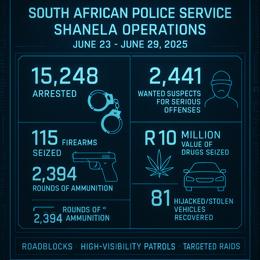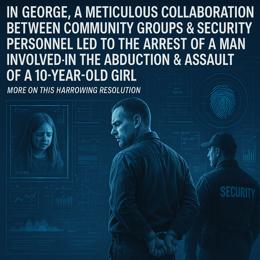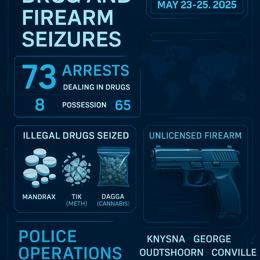Content created by AI
Gauteng's Controversial AmaPanyaza Wardens Accused of Spurring Crime Surge in North West Province
In a startling turn of events, the Gauteng Crime Prevention Wardens, commonly known as 'amaPanyaza', find themselves at the center of a heated debate over crime control efficacy and unintended regional safety outcomes.
The program, initiated under the aegis of Gauteng Premier Panyaza Lesufi, was intended to act as a bolstering force in crime prevention across Gauteng. However, the wardens have recently faced intense scrutiny as multiple allegations surface.
Despite being mandated to support regular policing activities, the amaPanyaza have been restricted from operating within police precincts, following reports of them overstepping their authority and allegedly engaging in the assault of residents. This development has restricted them to patrolling the streets, but even in this capacity, their presence has proved highly contentious.
In a surprising claim, Mpho Maleme, Chief Director of the Civilian Secretariat at the Department of Community Safety and Transport in the North West province, has accused the program of inadvertently increasing criminal activities in his jurisdiction. According to Maleme, criminals have been migrating to the North West to evade the patrol wardens, leading to an upsurge in local crime and a noteworthy rise in attacks on visitors and tourists – an issue that critically affects the province's image and economic vitality through tourism.
This narrative puts a spotlight on the delicate balance regional security efforts must maintain, and the porous nature of administrative boundaries that criminals exploit for refuge. The accusations suggest a need for a coordinated interprovincial approach to crime prevention.
It is essential to analyze the impact of security initiatives not only within their immediate operational areas but also across broader geographical landscapes. The implications of Maleme's statements underscore a pivotal challenge in law enforcement: interventions must be well-thought-out and holistic, taking into consideration the mobility of criminal elements and the necessity of collaborative governance.
As the authorities work to verify the claims and establish a constructive dialogue between the provinces, the discourse around amaPanyaza's role accentuates the complexity of urban safety strategies within South Africa's diverse socio-political canvas.
If the allegations hold substance, the situation demands a reevaluation of the Crime Prevention Wardens project, taking lessons from its shortcomings and successes to craft a more unified and efficient crime prevention system that transcends provincial lines.
The rise of this controversy further signals the need for widespread community engagement, ensuring that state-driven security measures harmonize with the people's expectations and the legal framework governing civilian safety operations.
Given these developments, it is crucial for journalists, authorities, and communities to continue dialogues that address the intricate dynamics of crime and policing while seeking solutions that foster a safer environment for all.










